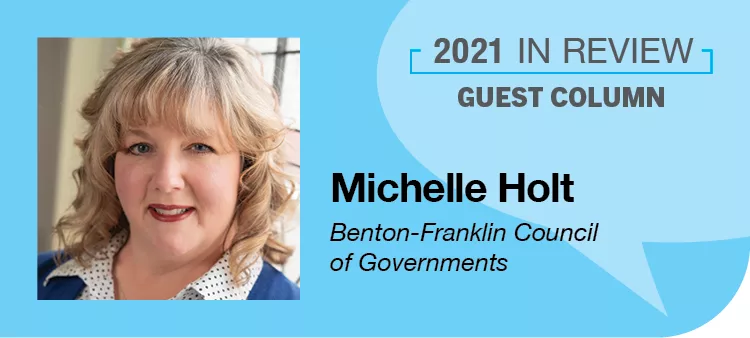
Home » How BFCOG impacts communities of Benton and Franklin counties
How BFCOG impacts communities of Benton and Franklin counties

January 3, 2022
I moved to Tri-Cities in February 2021 when I was hired as the new executive director for the Benton-Franklin Council of Governments (BFCOG). Everyone I have met is so welcoming. Their first question is always to ask where I work. When I tell them, their next statement is nearly always, “Oh, that sounds important. I’ve never heard of that. What do you do?”
I wish it was an easier question to answer! I am going to give it a shot.
Benton-Franklin Council of Governments convenes local governments to collaboratively plan, fund and administer solutions to shared community needs.
BFCOG facilitates the flow of state and federal funds into the region for transportation and economic development through planning activities and administration of related programs. BFCOG is made up of 18 member jurisdictions including Benton and Franklin counties, the metropolitan area cities of Richland, West Richland, Kennewick and Pasco, the rural communities within the counties, including Benton City, Prosser and Connell, and special districts like Benton Franklin Transit and Benton PUD.
Benton-Franklin Council of Governments was established in 1966 by voluntary association of local governments. Those governments had the vision to provide a forum for improved communication, multi-jurisdictional decision making, regional planning, and the ability to serve as a lead agency for programs that benefit multiple jurisdictions. The types of services provided to the member governments are outlined by Interlocal Agreement and can evolve as needs change. BFCOG currently fulfills the following roles and designations on behalf of the Benton-Franklin region that shape the services we provide:
• Regional Planning Commission (RCW 36.70.60)
• Conference of Governments (RCW 36.64.80)
• Regional Transportation Planning Organization (RCW 47.80.20) (WSDOT)
• Metropolitan Planning Organization/Transportation Management Area (Federal Highway – Administration, Federal Transit Administration)
• Economic Development District (US Department of Commerce, Economic Development Administration)
What does that really mean? BFCOG gathers data (like traffic counts and land uses), provides planning support (such as GIS mapping and traffic scenario modeling), develops transportation plans like the Metropolitan Transportation Plan (MTP), which is a 25-year forecast of regional transportation needs. BFCOG also administers the Surface Transportation Infrastructure Program (STIP) providing roughly $5 million in funding annually for local transportation projects in the region, a few of which being the Columbia Park Trail improvement project, Lewis Street overpass and the Duportail Bridge. These funds are distributed through a competitive process.
As the Economic Development District, with funding provided by the EDA, BFCOG produces a five-year economic development plan called the Comprehensive Economic Development Strategy (CEDS). The CEDS is used by state and federal funding programs as justification for investment in economic development projects that provide necessary infrastructure for industry and job creation. We administer several revolving loan programs designed to provide funding for startup and expansion of small local businesses that are ineligible for funding from traditional lenders. This fund has helped to start such notable Tri-Cities businesses as Gordon Estate Winery, Fiesta Mexican Restaurant and Ice Harbor Brewery).
Currently nearly $1 million is available for lending. BFCOG also provides education and connection to funding resources for local jurisdictions through activities like our Small Cities Program and coordinated quarterly meetings with Federal Delegation staffers and collaborate with jurisdictions on grant applications and program administration.
Since 2017, federal and state Transportation (FHWA/FTA/WSDOT) and Economic Development Administration (EDA) programs have provided direct project funding to local jurisdictions in the region of $42 million.
2021 brought many internal changes to BFCOG. In addition to a new executive director, multiple new and promoted staff members are bringing revitalization to this 55-year-old organization: Davin Diaz, community & economic development manager, and John Kennedy, economic resiliency coordinator, joined the team late in 2020. Erin Braich was promoted to transportation manager, and Magdelyn Monroy was promoted to office manager. Working with the rest of our team, we are all committed to providing accessibility and service to our member jurisdictions and regional partners.
2021 BFCOG Highlights
• Distribution of $5.4 million for local transportation projects.
• Produced the 2022 Transportation Priorities for the region.
• Regional Traffic Count Program, updated traffic data from other 600 locations across the region.
• Updated the Regional Bicycle Map, printed in both English and Spanish, distributed over 1500 copies.
• Received an additional $1.5 million in Coronavirus Response and Relief Supplemental Appropriations Act (CRRSAA) funding for regional transportation projects.
• Received a three-year, $600,000 EPA Brownfields Coalition Assessment Grant, providing assessment and remediation planning for properties with potential environmental barriers to re-development.
• Received $1.4 million in CARES Act funds for revolving loans and program administration.
• Received a $400,000 EDA grant to provide Covid recovery and economic resiliency planning.
• Produced and published the 2021-25 CEDS.
Looking forward to 2022, BFCOG is watching closely the federal Build Back Better Act and the Infrastructure Investment and Jobs Act (IIJA) which are filled with funding opportunities and program changes potentially benefitting important regional priorities. BFCOG will complete the next MTP – RegionalVision 2045, as well as an Economic Resiliency Plan for the region. Brownfield assessment and planning activities also will begin.
Tackling a new job in a new community during a worldwide pandemic has been a challenge, but one I am truly enjoying. BFCOG will continue to refine who we are as an organization and how we work collaboratively with our jurisdictional members and our federal, state and regional partners.
Here’s to a new year filled with resiliency, opportunity and economic vitality.
Michelle Holt is executive director of the Benton-Franklin Council of Governments.
Opinion Year in Review
KEYWORDS december 2021





